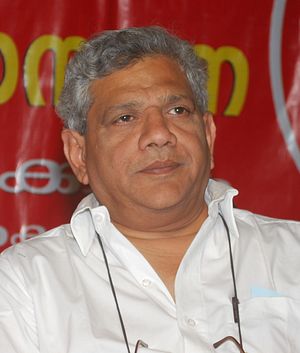Long before mainstream communist groups disappeared from the front pages of Indian newspapers, they slipped from the margins of national consciousness. Once India’s main opposition group, left-wing parties have shrunk so much that they face complete political irrelevance unless they can do something radical to retrieve the spotlight.
For the first time in many years, the Communist Party of India (Marxist) or CPI(M), the country’s leading Marxist group, is grabbing headlines in almost every mainstream and regional newspaper, comparing favorably with leading parties like the BJP and Congress.
The election of Sitaram Yechury as the General Secretary of the CPI(M) is driving that interest in the moribund party. The party chose Yechury as its new leader after six days of deliberation in the southern city of Visakhapatnam. The change in leadership has sparked a debate: can left-wing parties in India redefine themselves over 25 years since the end of the Cold War?
A maverick and a pragmatist, Yechury is one of the few well-known communist figures in India. He succeeds Prakash Karat, a dogmatic leader whose ten year reign saw a massive erosion in the CPI(M)’s base. His rigid stances on core party issues led to the breakup of the alliance between the Congress-led United Progressive Alliance (UPA) and left-wing groups in 2007, a split based on opposition to the civil nuclear deal with the United States. Karat is thought to have sabotaged the party’s chances in forming a coalition government in 1996 with Congress. Former Chief Minister of West Bengal and the veteran communist leader Jyoti Basu, who ran to lead the first communist government in Delhi, called this missed chance a “historic blunder”.
Yechury, the fifth General Secretary of the 50 year-old party, has the responsibility to correct that blunder and refresh the CPI(M)’s image for the 21st century. The party’s decline coincides with India’s economic rise and a vast expansion of its middle class, to more than 300 million people today. Most communists seem to be in denial of that growth, a potentially fatal view: no political party can survive in India without the middle class vote. Yechury will have to capture the imagination of a new generation and recover lost ground in the CPI(M)’s traditional base.
States like Kerala, Tripura, and West Bengal have been traditional strongholds of the CPI(M) and other left-wing parties. Today only Tripura, a tiny northeastern state, remains loyal to the group. In 2011, CPI(M) lost power in West Bengal to the Trinamool Congress (TC, a regional party). Communists had ruled the state for over three decades.
In the general election last May, left-wing parties managed to secure just 4 percent of the vote, a decline of 3 percent over a five-year period. CPI(M)’s immediate challenge is regaining ground in West Bengal’s 2016 elections, where it will be facing the ruling TC and a resurgent Bharatiya Janata Party (BJP) on the right, which has high hopes for this crucial state. Since 2011, communists have been ceding ground to political rivals in their former bastion.
That’s a huge problem for the CPI(M). Historian Harbas Mukhia writes in The Indian Express that “ever evolving modes of thought, strategies and forms of mobilization to gain political space in India is the chief challenge before the new team in the party’s politburo.”
But there are also questions about the CPI(M)’s political line. Under Karat, the party maintained distance from other secular parties like the Congress. As a result, the BJP came to dominate the political discourse.
The Hindu writes in an editorial that Yechury “can be expected to formulate a pragmatic change in the attitude of the CPI(M) to allow it to play a part in the States where it is a contender for power and at the all-India level, as a binding force for not only the left parties but also for secular and regional parties.”
In his address to party workers, Yechury’s main target was Prime Minister Modi, who he attacked for promoting Hindu communalism in the country. The thinking is clear. Under new leadership, the CPI(M) and the Congress could push for greater coordination to take on their common enemy: the BJP.
But will the left be able to transform, as the communists in Europe did after the fall of the Berlin Wall, by rebranding themselves as social democrats?
Perhaps that’s the only way for them to remain relevant.
































